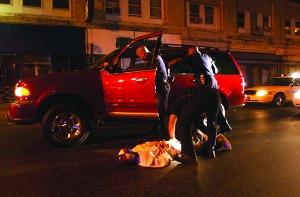If anyone needs a reason to consider voting "yes" on California's Proposition 19, we've got 550,000 of them right here.
He led the effort to imprison Prince of Pot Marc Emery, but now former federal prosecutor John McVay has emerged from the dark side.
The mass murder of 72 migrants reported two weeks ago continued to suck up more lives in its aftermath. Three suspected murderers from the incident, and two police officers who were investigating it, were found dead this week.
Why do I feel like I just keep writing the same stories of law enforcement venality over and over again? More crooked jail guards, more sticky-fingered cops, more cops on the take, and another pervert power-tripper cop.
Prop 19's lead has dropped three points in the latest SurveyUSA poll, but it's still leading with the election less than 60 days away.
To gently chide Mexico for continuing human rights violations by its military, the US will withold $26 million that Mexico won't see until next year anyway. To make up for that, the US is releasing $36 million it withheld last year.
Voters in Madison, Wisconsin, will have a chance to tell their legislators where they stand on medical marijuana in November, and a second town is considering it, too.
Possessing up to four grams of crack or 14 grams of powder cocaine is just a misdemeanor in Maine, and the Portland police chief wants to change that.
A tea party insurgent running for the Kentucky Republican gubernatorial nomination said last week he support hemp production. That makes two hempsters in the 2011 race.
The numbe of Israeli medical marijuana patients is set to expand dramatically after the Health Ministry allowed the number of doctors allowed to prescribe it from one to six.
According to figures from the California Criminal Justice Statistics Center, more than 550,000 people were charged with misdemeanor marijuana possession in the Golden State between 1999 and 2009. Last year, 61,164 people were charged with pot possession, down slightly from 2008's record 61,388.
The number of small-time pot arrests hovered at around 50,000 a year for most of the decade. But in 2007, it jumped to just under 60,000, and crossed that threshold in 2008.
That could change this year, though. A bill, SB 1449, approved by the state legislature last week would change the misdemeanor to a civil infraction. It awaits action on Gov. Schwarzenegger's desk. The Proposition 19 marijuana legalization initiative would allow people 21 or over to possess up to an ounce without fear of arrest and grow up to 25 square feet. It goes before the voters on November 2.
That wouldn't be a minute too soon, for some. "It's morally offensive that in a state like California, where a majority of Californians favor outright legalization and where as far back as 1977 they thought they had it decriminalized, the law enforcement community continues to ignore the will of the citizens of the state," said Keith Stroup, founder of the National Organization for the Reform of Marijuana Laws (NORML).
"This is just another example of why we need to end marijuana prohibition and why we hope California voters will pass Proposition 19 this November," said Mike Meno, communications director for the Marijuana Policy Project. "We're criminalizing people and turning their lives upside down simply for using a substance that's safer than alcohol. It's also a huge misallocation of law enforcement resources. Even if they're not going to jail, these busts are still taking up police officers' time and clogging up the court system. This is all the more reason I hope voters really flock to the polls in November."
Under California law, possession of up to an ounce is a misdemeanor punishable only by a maximum $100 fine for a first offense. But because it is a misdemeanor -- not a civil infraction -- you can be arrested, and each offense requires a court appearance, leading to costs for the criminal justice system, as well as costs and a criminal record -- at least temporarily -- for the arrestee.
"People are usually cited and released, but they could be arrested," said Omar Figueroa, a Sebastopol-based marijuana defense attorney. "The law says they can be arrested for misdemeanor marijuana possession, and they will be if they don't have satisfactory proof of ID or if they ask to go before a judge."
It varies from locality to locality, Figueroa said. "In Berkeley, they try to process them in traffic court, even though it's technically a misdemeanor. A lot depends on the cop's discretion."
People charged with a misdemeanor have the right to counsel and the right to a jury trial. Ironically, both Figueroa and Dale Gieringer, longtime head of California NORML, said that exercising that right to trial could result in the charges being dropped.
"Some people have demanded jury trials," noted Gieringer, "and when you do that, you almost always find the charges getting dropped, because when the worst outcome is a $100 fine, it just isn't worth it."
"With the maximum sentence being a $100 fine, the system doesn't want to put out that much energy in picking a jury," said Figueroa, but don't count on it. "My first jury trial was pot possession misdemeanor in Los Angeles County. But if you're in San Francisco or Alameda County and you insist on your right to a jury trial, it will probably be dismissed."
Pleading guilty means a criminal record and all that entails, including collateral consequences like loss of access to public housing, but only for two years. Then, if you've managed to stay out of trouble, the conviction is expunged. But some judges push minor pot offenders into treatment, said Gieringer.
"Many judges railroad the defendants into not taking the misdemeanor plea, but instead doing a drug program, the advantage of which is that you have no conviction at all, but it's very expensive and time consuming," he said.
Even having to show up for a court appearance can be burdensome, Gieringer said. "I know one UCLA student who had to go to Arcata [600 miles away] for a court appearance. It's also an inconvenience for the court. It's got to cost well over $100 for the state to assemble all the manpower for a pot misdemeanor hearing, and with 60,000 cases, that's $6 million wasted right there."
"It would be good to see that decrim bill signed into law or Prop 19 pass," said Stroup. "Or both," he laughed.
"Back when we did the decrim bill in the 1976, the district attorneys said it had to remain a criminal offense," said Gieringer. "The bill now pending would abolish that status. If Schwarzenegger can't sign this current decrim bill, there is something really sick in California politics." Gieringer laughed ruefully, adding, "Of course, we know there is something really sick in California politics."
"This same decriminalization proposal was defeated here three times in the past," said Gieringer. "I think its passage this year is an indication that you can get lawmakers to reduce penalties as a cost-cutting measure. The reason it passed this time was the budget crisis -- even the prosecutors and the courts supported the bill on the grounds of cutting costs."
That's just misdemeanor pot possession. An additional 135,000 people have been arrested on felony marijuana cultivation or distribution charges in the past decade. For all drug felonies, that figure rises to 1.4 million over the past decade.
An additional 850,000 arrests were made for non-marijuana drug misdemeanors. These are typically possession of personal use amounts of hashish, non-opiate prescription medications, and similar drugs on Schedules III, IV, and V of the state drug law, which can be charged as either felonies or misdemeanors. Figueroa called such charges "wobblers," since they can be charged either way.
While last year's 78,514 marijuana arrests (felonies and misdemeanors) is an all-time high, arrests for other drug offenses are declining. Narcotics (heroin and cocaine) felony arrests peaked at more than 56,000 in 2007, but declined to just under 44,000 last year, while dangerous drug felony arrests have declined by half since peaking at nearly 93,000 in 2005.
The huge number of drug arrests in general and marijuana arrests in particular come as the state is experiencing its lowest crime levels in three decades and a skyrocketing criminal justice system budget. In 1968, total criminal justice system (law enforcement, corrections, courts, prosecutors, public defenders) were at about $100 million, by 1984, when crime rates had already begun falling, the criminal justice budget was at about $5 billion. Last year, it was about $33 billion, mostly for police ($17 billion) and prisons ($15 billion).
Passage of Prop 19 or the signing of the decriminalization bill could begin to rein in the California criminal justice juggernaut, but that would just be a start. Still, you have to start somewhere. Real decrim would be good, but if California votes for legalization, it will be a political earthquake.
back to top
(Update: On Saturday, September 18, Emery supporters are organizing Free Marc Emery rallies worldwide. Read the listings and other information here. Supporters are also calling on the Canadian government to repatriate Emery into the Canadian justice system, a right they have under treaty.)
In a Seattle Times op-ed Saturday, former US Attorney for the Western District of Washington John McKay defected to the other side. As the federal prosecutor in Seattle, McKay oversaw the indictment and prosecution of Canadian marijuana seed seller and pot advocate Marc Emery, who now sits in an American federal detention facility awaiting the formal handing down of a five-year prison sentence later this month.
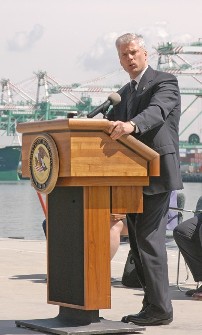
better late than never: John McKay
But while he thinks Emery and most pot-smokers are "idiots," McKay has come to see the futility of continuing to enforce marijuana prohibition. "As Emery's prosecutor and a former federal law-enforcement official, however, I'm not afraid to say out loud what most of my former colleagues know is true: Our marijuana policy is dangerous and wrong and should be changed through the legislative process to better protect the public safety," he wrote.
Marijuana prohibition "has utterly failed," McKay concluded. "The demand for marijuana in this country has for decades outpaced the ability of law enforcement to eliminate it," he declared, ready to throw in the towel.
"Brave agents and cops continue to risk their lives in a futile attempt to enforce misguided laws that do not match the realities of our society," he wrote. "These same agents and cops, along with prosecutors, judges and jailers, know we can't win by arresting all those involved in the massive importation, growth or distribution of marijuana, nor by locking up all the pot smokers."
Pot prohibition fills the pockets of "Mexican and other international drug cartels and gangs," even though marijuana is nowhere nearly as harmful to users as other illegal drugs, McKay wrote.
"So the policy is wrong, the law has failed, the public is endangered, no one in law enforcement is talking about it and precious few policymakers will honestly face the soft-on-crime sound bite in their next elections. What should be done?" McKay asks.
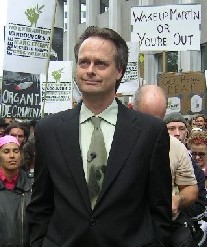
Marc Emery
It is a rhetorical question, of course, and McKay has answers: Recognize that the real public safety danger to Americans is not from marijuana but from prohibition, build policy on "sound science, not myth," and... drum roll please... "We should give serious consideration to heavy regulation and taxation of the marijuana industry (an industry that is very real and dangerously underground). We should limit pot's content of the active ingredient THC (tetrahydrocannabinol), regulate its sale to adults who are dumb enough to want it and maintain criminal penalties for sales, possession or use by minors, drivers and boaters."
Not to worry, though, McKay assures his erstwhile partners in the prohibition racket. There will be years to come of extirpating criminality from the former black market, and that means job security: "DEA and its law-enforcement partners must therefore remain well equipped and staffed to accomplish this task: to protect our families from truly dangerous drugs and to drive drug cartels, gangs and dope dealers from our society."
Still, a remarkably candid confession from a man who made a living prosecuting marijuana offenders. Too bad he didn't find himself on the road to Damascus when he still had the prosecutors' powers.
back to top
by Bernd Debusmann, Jr.
Mexican drug trafficking organizations make billions each year smuggling drugs into the United States, profiting enormously from the prohibitionist drug policies of the US government. Since Mexican president Felipe Calderon took office in December 2006 and called the armed forces into the fight against the so-called cartels, prohibition-related violence has killed more than 28,000 people, the government reported in August. The increasing militarization of the drug war and the arrest of dozens of high-profile drug traffickers have failed to stem the flow of drugs -- or the violence -- whatsoever. The Merida initiative, which provides $1.4 billion over three years for the US to assist the Mexican government with training, equipment and intelligence, has so far failed to make a difference. Here are a few of the latest developments in Mexico's drug war:
Thursday, September 2
In Tamaulipas, 25 gunmen were killed in an army raid on a building in Ciudad Mier. Two soldiers were wounded in the fighting, which began after a military aircraft spotted a group of gunmen. In a separate incident, five gunmen were killed during a clash with soldiers near Juarez, Nuevo Leon the next day. All 30 of the dead are thought to be members of the Zetas Organization.
Near Tampico, Tamaulipas, gunmen kidnapped the cousin of Televisa owner Emilio Azcarraga Jean. Fernando Azcarraga Lopez, a former mayor of Tampico, was taken from a coffee shop and released four hours later.
Friday, September 3
In Cancun, authorities arrested six men in relation to a firebombing of a bar which killed eight people. The Attorney General for the state of Quintana Roo has said that the men have claimed to have been hired by a drug trafficking organization to throw gasoline bombs at the bar. It is unclear which drug gang is responsible for ordering the attack.
Saturday, September 4
In Chihuahua, a female municipal police officer was killed as her children slept in the next room. The incident occurred when a group of gunmen stormed her house. The two children were left unharmed, but a man who was in the house with her received a gunshot wound and was hospitalized.
Monday, September 6
In Nuevo Leon, a 15-year old boy and another individual were killed after soldiers opened fire on the car in which they were traveling at a checkpoint. The Department of Defense has said they are investigating the incident and expressed condolences to the family of the victims.
In Tamaulipas, the bodies of three men suspected of involvement in the murder of 72 migrants were discovered by authorities after receiving an anonymous tip. On Tuesday, one of the survivors of the attack said that he believed that the men were present during the incident.
Wednesday, September 8
In Tamaulipas, two bodies were discovered which appear to be those of a missing investigator and a police officer who were working on the case of the 72 murdered migrants. The bodies were found about 30 miles away from San Fernando, the town in which the massacre occurred.
Total Body Count for the Week: 158
Total Body Count for the Year: 7,728
Read the previous Mexico Drug War Update here.
back to top
Why do I feel like I just keep writing the same stories of law enforcement venality over and over again? More crooked jail guards, more sticky-fingered cops, more cops on the take, and another pervert power-tripper cop. Let's get to it:

too much cash can corrupt cops
In Graceville, Florida,
a prison guard was arrested last Friday for trying to smuggle pot into the prison. Graceville Correctional Facility guard Brandon Sikora, 21, is charged with attempting to introduce contraband into a secure facility and possession of more than 20 grams of marijuana with intent to distribute. He went down in a sting after agreeing to meet a police informant, who gave him half a pound of marijuana to carry into the prison and $2,000 for his efforts. He's now suspended from his job, too.
In Riviera Beach, Florida,
a Riviera Beach police officer was fired August 26 over allegations he had a relationship with violent drug dealers. Officer Nathan Gordon had been on administrative leave since July while the department's Internal Affairs Division investigates. He is now accused of providing the home addresses of fellow officers to drug gang enforcers. No word yet on any possible criminal charges.
In San Antonio, Texas,
a San Antonio police officer was arrested August 31 for allegedly sexually abusing a young woman he pulled over and found had a small amount of marijuana and a pipe. Officer James McClure is charged with official oppression and is out on a $3,500 bond. McLure allegedly made the victim follow him to business center, where he strip searched her, groped her, and gave her pot back. The victim also claims McClure asked her for her phone number and called her for a date after a previous stop. He is on indefinite suspension.
In Milwaukee,
a former Milwaukee police officer and state drug agent was sentenced September 2 to six months of house arrest after being caught stealing money in an FBI sting. Johnny Santiago was arrested in March after being filmed pocketing $1,100 of $17,000 found by him and other police officers during a drug investigation. He was working as a drug agent for the state Department of Justice at the time.
In Atlanta,
a former Atlanta police officer pleaded guilty September 2 to federal charges after getting caught in a sting where the drug dealers he thought he was protecting were actually undercover FBI agents. Lucius Solomon III, 31, was charged in March with attempting to distribute more than five kilograms of cocaine and possessing a firearm while participating in multiple cocaine sales. In the plea bargain, the gun charge was dropped. The nine-year veteran is now out on bail awaiting sentencing.
back to top
California's Proposition 19, the tax and regulate cannabis marijuana legalization initiative, continues to lead in the latest SurveyUSA poll of likely voters, but with a smaller lead than two previous SurveyUSA polls. The latest poll has the support for the initiative at 47%, with 43% opposed and 10% undecided.
July and August polls from SurveyUSA had support for Prop 19 at 50%, opposition at 40%, and 10% undecided. The poll numbers suggest that the opposition is managing to peel away some people who had previously indicated they would support the measure.
The initiative, sponsored by Oakland medical marijuana entrepreneur Richard Lee, would legalize the possession of up to an ounce of marijuana by people 21 or over. It would also allow adults to grow up to 25 square feet of pot and possess the resulting harvest. It would give cities and counties the local option of taxing and regulating marijuana sales.
According to the poll, Prop 19 has majority support among men (54%), but not women (40%); people under 50 (51%), but not those over 50 (43%); Democrats (51%), but not independents (49%) or Republicans (39%); and whites (52%), but not blacks (40%), Asians (39%), or Hispanics (38%).
With now less than two months until election day, it seems more clear than ever that the Prop 19 campaign is going to come down to the wire. Turnout will be key, especially among young voters. The 18-to-34 age group supports Prop 19 by 59% to 33%. The only demographic in the poll that exceeded that was liberals, with 61%.
back to top
The Obama administration is withholding $26 million in anti-drug aid to Mexico that was appropriated this year because Mexico failed to meet human rights conditions. But at the same time, it is releasing $36 million it withheld last year for the same reason because Mexico has made some human rights improvements, the State Department said in a report released to the Senate Friday.
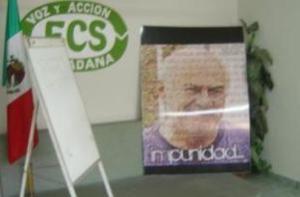
poster of assassinated human rights advocate Ricardo Murillo
In 2008, as Mexico sank deeper into prohibition-fueled mayhem, Washington approved a $1.4 billion, three-year assistance package called Plan Merida. Part of that legislation mandated Mexican compliance with human rights conditions.
"We believe there has been progress, very significant progress, on human rights in Mexico, but as a policy decision -- not a legal decision -- we are going to wait on a portion of new funding because we think additional progress can be made," said Roberta Jacobson, a deputy assistant secretary for Mexico and Canada at the State Department.
The State Department is withholding 15% of this year's appropriation until Mexico takes a series of measures. Those include limiting the authority of military courts in cases involving abuse of civilians, improving communications with human rights groups in Mexico, and enhancing the authority of the National Human Rights Commission.
Complaints of human rights abuses by the Mexican military have risen sharply since President Felipe Calderon deployed the Army against drug traffickers in December 2006. More than 2,200 have been filed with the National Human Rights Commission since then, but there is little information available about how those complaints have been resolved.
In one incident that renewed calls from human rights groups that civilian authorities -- not the military -- investigate cases involving the military, human rights officials accused the Army of shooting two children and claiming they were caught in the crossfire of a shootout between soldiers and gunmen. In that April incident, two brothers age five and nine were killed. Surviving family members said they were shot by soldiers at a highway checkpoint.
The Mexican government responded by saying it is trying to improve human rights and that Washington should send money faster and not stick its nose in Mexico's business.
"The State Department report establishes that the government of Mexico is carrying out actions to strengthen the observance of human rights," the Mexican Foreign Relations Department said in a statement. "Cooperation with the United States against transnational organized crime through the framework of the Merida Initiative is based on shared responsibility, mutual trust and respect for the jurisdiction of each country, not on unilateral plans for evaluating and conditions unacceptable to the government of Mexico."
The State Department action won mixed reviews from human rights and advocacy groups north of the border. Maureen Meyer of the
Washington Office on Latin America told the
Associated Press that withholding the funds sends the message "that you cannot fight crime with crime and you cannot fight drugs while tolerating abuses by your security forces."
But Nik Steinberg of
Human Rights Watch told the
Washington Post the funding freeze didn't go nearly far enough. "Nothing should have been released, because Mexico is simply not meeting the human rights requirements," Steinberg said. "There are widespread and systematic abuses by the military, for which they have total impunity."
back to top
Voters in Dane County, Wisconsin, the home of Madison, the state's capital and second largest city, will be asked if they support passage of a state medical marijuana law, and they might not be alone. A city councilman in River Falls last week filed petitions seeking to put the same question on the local ballot in that town of nearly 15,000 in west-central Wisconsin, near the Twin Cities.
In the November 2 election, Dane County, voters will be asked: "Should the Wisconsin Legislature enact legislation allowing residents with debilitating medical conditions to acquire and possess marijuana for medical purposes if supported by their physician?"
The move comes after medical marijuana activists such as Is My Medicine Legal Yet (IMMLY) have spent years trying to get the state legislature to pass a bill, to no avail. It is designed to show legislators they have nothing to fear politically by approving medical marijuana, and to suggest that the opposite could be the case.
The Madison resolution was approved by the Dane County Board in a unanimous voice vote on July 15. The charge was led by east side supervisors John Hendrick and Barbara Vedder, according to a report from IMMLY's Gary Storck.
"I would just invite all of you to join Representative Vedder to represent our constituents and to represent the opportunity for all of your constituents to vote on this in November and to advise the legislature that they have nothing to fear from the people of Wisconsin if they decide to pass a bill to legalize medical marijuana," Hendrick told his colleagues before the vote.
And they took him up on it. Now, the city council in River Falls will have the same opportunity, after City Council Member Bob Hughes filed more than 800 signatures last week with the city clerk's office seeking to put a referendum question with identical language there.
Now, the city attorney will review the referendum question and then submit it to the city council. The council will then vote on whether to add the question to the ballot.
"Some community members contacted me about it and asked if I was willing to help," Hughes said. It is another step in the process of bringing medical marijuana to Wisconsin, he said.
Fourteen states and the District of Columbia have already approved medical marijuana, although programs are not yet in effect in New Jersey or the District. Arizona will vote on it in November.
back to top
Portland, Maine, Police Chief James Craig is pushing to increase some crack and powder cocaine offenses from misdemeanors to felonies, but he isn't exactly receiving a warm reception from lawmakers concerned about prison overcrowding. He told the Portland Press Herald Tuesday that he plans to meet with other police chiefs, prosecutors, and legislators to plot his brave push backward into the 20th Century.

Looking Backwards: Portland Police Chief James Craig
Under Maine law, first time possession of up to four grams of crack and 14 grams of powder cocaine is a misdemeanor. A second offense is a felony, as is possession of more than those amounts.
"Crack cocaine breeds violence," Craig said. "Crack cocaine will destroy this community if we don't stay ahead of it."
He cited recent incidents in the city that he attributed to cocaine users. He said three home invasions, three robberies, and a stabbing in a recent one-week period were committed by coked-out individuals.
Rep. Anne Haskell (D-Portland), co-chair of the Legislature's Criminal Justice and Public Safety Committee, told the Press Herald she would listen to Craig's proposal, but expressed concern about costs.
"I'd be glad to have a conversation with Chief Craig and take a look at the kinds of things he's seeing. He's the person on the ground," she said. "If what he's seeing out there is what's happening, then folks ought to be held accountable, but we would have to find the money to do that," she said.
But Sen. Stan Gerzofsky (D-Brunswick), the committee's senate chair, was more wary. "We're not going to start enhancing some of these crimes to fill up our prisons more than we have now," he said. "The legislature was very good at enhancing crimes and the time served, and we got ourselves in a pretty good mess."
Times
have changed when cops looking for longer sentences for drug users are met by skepticism in the legislature.
back to top
Kentucky Republican gubernatorial candidate Phil Moffett has come out in support of legalizing industrial hemp production. That makes him the second gubernatorial candidate in the state to embrace the idea. Perennial independent candidate Gatewood Galbraith has called for its legalization for years.
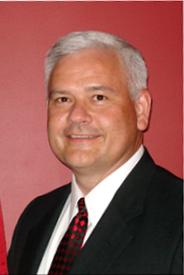
Phil Moffett
Moffett is one of at least three Republicans contending for the party's nod to challenge incumbent Democratic Gov. Steven Beshear. The gubernatorial election is set for 2011.
Moffett, who along with US Senate candidate Rand Paul is part of the tea party insurgency within the Bluegrass State's Republican Party, came out on the issue in response to a question during a meeting with libertarian voters last Thursday and reaffirmed his support in an interview with the
Associated Press last Friday.
He is ready to "go to the carpet" to legalize hemp production, he told the AP. "We're going to have to challenge the federal authority to keep us from growing a legitimate crop," he said. "Industrial hemp is not a drug, so it shouldn't be regulated by the DEA or any other federal authority."
Moffett said he supported hemp production both for economic reasons and as a means of reducing the power of the federal government. "It's a farm product that can be used in a number of different ways to create jobs, but it's also a way to get the federal government farther off our back," Moffett said Friday. "Right now, the Drug Enforcement Agency does not allow hemp to be grown, and it would be a great test case for us to fight against the federal government to be able grow a completely legitimate crop that the federal government has decided they don't believe is worthy of planting."
Moffett doesn't favor marijuana legalization and he opposes medical marijuana "on an official level," he said. "But on a personal level, if someone were dying of cancer and marijuana was the only way they could find comfort, I'm not going to get in the way," he said. "There's a humanitarian aspect to this."
While industrial hemp may be imported for use in this country, American farmers are barred from growing it by the federal government. Nine states -- Hawaii, Kentucky, Maine, Maryland, Montana, North Dakota, Oregon, Vermont, and West Virginia -- have passed legislation removing barriers to its production or research, according to the industry group
Vote Hemp.
(This article was published by StoptheDrugWar.org's lobbying arm, the Drug Reform Coordination Network, which also shares the cost of maintaining this web site. DRCNet Foundation takes no positions on candidates for public office, in compliance with section 501(c)(3) of the Internal Revenue Code, and does not pay for reporting that could be interpreted or misinterpreted as doing so.)back to top
The Israeli Health Ministry Sunday moved to broaden access to medical marijuana by approving five more doctors to prescribe it, the Israeli newspaper Haaretz reported. Until now, the ministry had authorized only one doctor, Dr. Yehuda Baruch of the Abarbanel psychiatric hospital, to prescribe it to an ever-growing number of patients.

Israel Medical Marijuana banner (irxmj.org)
Sunday's announcement is part of a pilot program designed to increase the number of doctors allowed to prescribe medical marijuana. If this expansion of prescribing privileges pans out, it will then be extended to doctors who are department managers in Israeli health maintenance organizations.
The number of Israelis who have been prescribed marijuana was two in 2000, 10 in 2005, 700 in the middle of last year, and may be as high as 2,000 now. A Health Ministry official estimated that, with the lessening of the prescribing bottleneck, the number could increase to 5000 by year's end and tens of thousands in the future.
Doctors are authorized to prescribe medical marijuana to patients suffering from chronic pain, including patients with fibromyalgia, cancer, HIV/AIDS, neurological disorders, multiple sclerosis, asthma and glaucoma, as well as to Israel Defense Forces veterans suffering from post-traumatic stress disorder.
The broadening of prescribing privileges will also mean an increase in authorized production. Currently, only three of 14 authorized grow ops are operating, but that will probably change quickly. The medicine is provided free, but patients must pay a monthly fee of $95 to help cover growing expenses.
back to top
